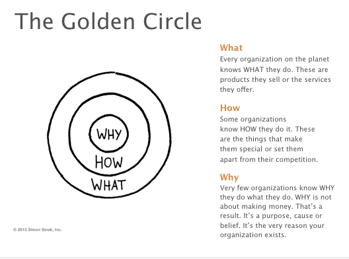START WITH "WHY"
Let’s look at Simon Sinek’s Golden Circle Formula and go right to the heart of the issue – “why”. (If you have not watched this video on Ted Talks, do so; it is a must for anyone in leadership, management AND sales.)

“Why” is the most important thing to uncover when…
- attempting to alter behavior,
- move towards a specific outcome or
- understand why someone would be willing to go through the pain of change when it is so much easier to deal with the status quo.
PAIN... IS A POWERFUL MOTIVATOR
Years ago, when I heard Tony Robbins speak in Cincinnati about Pain and Pleasure, he stated:
“People will do whatever it takes to avoid the pain they have today,
the pain they foresee in the future or to arrive at a pleasurable outcome.
Avoiding pain will always trump pursuing pleasurable outcomes.”
Sales meetings, great massages and colonoscopy visits – when conducted and executed well - change behavior, improve skill and impact future outcomes. However, yes, they can be painful.
A LITTLE BACKGROUND TO GET THINGS ROLLING
This week, I had a massage… as well as a colonoscopy (although I realize that is more information than you wanted to know…). During the massage a couple days ago, they found a pressure point in the middle of my right shoulder blade that was tense with stress. When the masseuse applied pressure, there was definite pain. But, once I got through the pain, I was rewarded with less stress and now the impinged shoulder isn’t as painful.
Today, I had my colonoscopy. Now, if you’ve done this in the past, you know the drill and the “pain” of it all. The pain or discomfort isn’t so much with the procedure, but with the prep. That god-awful stuff you have to drink, the endless hours on the commode, the cramps in your intestines as well as all the good-natured ribbing you get at work (What? You don’t share this moment with co-workers?). And then, you have some definite discomfort at the end when you are trying to relieve the pressure while in the post-op “GAS CHAMBER”.
HOW ALL THIS RELATES TO SALES MEETINGS
So, after laying all that as a foundation, I’m sure you are wondering, “Why is Tony talking about sales meetings, massages and colonoscopies?!?” Well…
- Too many sales meetings are conducted like a great massage:
- Soothing
- Relaxing
- No tension
- Positive environment
- People leave without any kind of stress or care
- Too many sales meetings are also being conducted like colonoscopies
- People that have been to them before don’t want to do them again
- The prep for both is critical for success
- Often, if the environment isn’t controlled, there ends up being a lot of gas expelled
- Sometimes, depending on the doctor, the anesthesia and/or the meeting, people are put to sleep or, at a minimum, in “twilight”
- Everyone is starving for something productive to happen during the “meetings”, but too often they come to “the table” hungry and leave hungry
- Everyone is thrilled that they only have to go through all that once in a while
Do you see any correlations? You might find yourself agreeing to many of the bullet points above. You might also be able to relate to some of the things that aren’t too good about the sales meetings you have attended or conducted. The purpose of this writing is to help shed some light on the right combination of things in a meeting that should happen so that:
- Meetings are productive
- No one wants to miss your meetings
- People learn and grow their practices as a result of the meetings
- They don’t have to sit through painful re-enactments of each salesperson’s pipeline discussion (Truly, this is like multiple colonoscopies on the same day!)
WHEN THE BENEFITS OUTWEIGH THE PAIN
Here are the correct procedures for sales meetings, massages and medical procedures that will result in a clean bill of health:
- At a certain age, colonoscopies are non-negotiable. Effective sales meetings are not negotiable any time for any company of any age.
- Preparation is required to have a great outcome
- You know you have great outcomes if: (These are in BOLD because they are IMPORTANT!)
- People never miss, leave early, or arrive late
- Your people learn something that they can implement right away to help them grow their business
- The meetings are all about selling and driving sales growth
- No ops discussions
- No underwriting discussions
- No business strategy discussions but “foot soldier” discussions on strategies to gain entry into markets
- Anything that can be communicated via email should be done so
- People should leave the meeting re-invigorated, but also mindful of what it takes to maintain a stress-free existence in the organization
- Activity and production requirements must be met
- Mediocrity is unacceptable
- People will be coached with a disciplined approach for improvement if they begin failing at activity or production
- And finally, just like after a colonoscopy, people may not always want to return for another one; but the upside is that benefits (health and sales success) outweigh the pain of the procedure!
WHAT I GAINED FROM THE EXPERIENCE
During my exam, they found 5 polyps and removed them all. Don’t panic; the doctor did not indicate that I had a problem. It’s just when you get to a certain age, you find little skin things hanging off of your body all over the place. Why should the colon be exempted? (Again, too much information? Ha ha)
Here are my other massage and colonoscopy outcomes:
- I learned from it: keep doing the right things – exercise, diet and sleep
- I am now stress-free for a while because I have a clean bill of health on my colon
- I feel 5 pounds lighter, which is always a good thing
- I came home and slept soundly for another 5 hours after only getting 3.5 hours of interrupted sleep the night before. Admit it, you would all like to sleep like that once in a while and you KNOW it would be good for you
- It brought my wife and I closer together. We both had the chance to be supportive because she also went through this; hers was last week. It was an opportunity to put the world outside for a while and just focus on each other.
WHAT YOU CAN GAIN FROM THE EXPERIENCE
Positive outcomes of a great sales meeting:
- Unsuitable opportunities (that actually create an unhealthy approach to prospecting) are jettisoned from the pipeline
- Something is learned that can have a positive and dramatic impact on sales success
- Salespeople, who are getting the right results and doing the right things, get recognized
- Sales skills are improved because upcoming sales or prospecting calls are role-played and practiced
- People left the meeting feeling like part of a successful team – where everyone cares about one another and knows they are all fighting for the same successful outcomes

Additional Resources:









